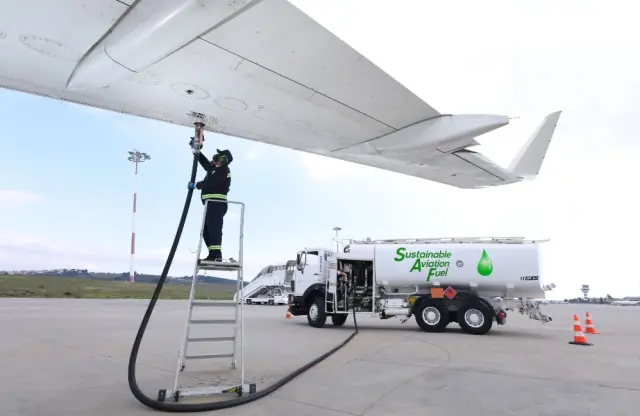Putting The Focus On Sustainability In The Aviation Industry
 Share
Share
 Copy Url
Copy Url

Sustainability in the aviation industry is becoming a hot topic as the world shifts towards greener practices. With the aviation sector responsible for a significant share of global carbon emissions, the push for sustainability is stronger than ever. This move isn't only about reducing our environmental impact. It's also about creating a future where air travel is both efficient and eco-friendly. As we explore this shift, we'll see how innovative solutions and green technologies are reshaping the skies.
In this article, we'll dive into why there's a pressing need for sustainability in the aviation industry. We'll look at the benefits of making the aviation industry sustainable, and highlight five key changes the industry is implementing to achieve this goal. Finally, we'll examine the effect of these changes on the Indian aviation industry. Get ready to learn how the aviation industry is flying towards a more sustainable future.

Why is there a Need for Sustainability in the Aviation Industry?
The need for sustainability in the aviation industry is becoming increasingly urgent. As the world becomes more conscious of its environmental impact, the aviation sector must adapt to meet new challenges and goals. Here are some key reasons why sustainability is crucial in aviation:
1. Reducing Carbon Emissions
The aviation industry significantly contributes to global carbon emissions. By focusing on sustainability in the aviation industry, we can put in place greener technologies and practices. This effort is essential for reducing carbon emissions and mitigating climate change. Cleaner fuels, improved engine efficiency, and better flight management can all play a role in this transformation.
2. Achieving Net-Zero Emissions by 2050
The aviation sector has committed to achieving net-zero emissions by 2050. This ambitious goal requires substantial changes in how we design, fuel, and operate aircraft. By investing in sustainability now, the industry can develop the innovations needed to meet this target. This commitment will help protect our planet for future generations.
3. Enhancing Corporate Sustainability
Airlines and aviation companies are increasingly focused on corporate sustainability. Customers and investors demand more environmentally responsible business practices. By prioritizing sustainability in the aviation industry, companies can improve their brand image. They can also attract eco-conscious travelers and meet investor expectations. This shift towards greener operations is beneficial for businesses and the environment.
4. Minimizing Environmental Impact
The aviation industry has a significant environmental impact. This includes noise pollution and habitat disruption. By adopting sustainable practices, the industry can cut down its negative effects on the environment. This includes using quieter, more efficient aircraft and implementing better waste management practices. Reducing the environmental footprint of aviation is essential for preserving natural ecosystems.
5. Meeting Regulatory Requirements
Governments and international organizations are implementing stricter regulations to combat climate change. The aviation sector must follow these regulations, which often require sustainable practices. By proactively adopting sustainability measures, the industry can stay ahead of regulatory demands. This approach helps avoid potential penalties. This proactive approach ensures smooth operations and legal compliance.
By understanding and addressing these points, the aviation industry can pave the way towards a more sustainable future.

What are the Benefits of Making the Aviation Industry Sustainable?
Embracing sustainability in the aviation industry offers numerous advantages. From reducing environmental harm to enhancing business practices, here are ten key benefits of making the aviation industry more sustainable:
1. Lower Carbon Footprint
Sustainability in the aviation industry helps reduce its carbon footprint. Using alternative fuels and more efficient engines decreases the amount of CO2 released into the atmosphere. This reduction is crucial in the fight against climate change.
2. Cost Savings
Improving sustainability can lead to significant cost savings. Energy-efficient technologies and sustainable practices often reduce fuel consumption and operational costs. These savings can be reinvested into further sustainability initiatives or other business areas.
3. Enhanced Brand Reputation
Airlines that prioritize sustainability in the aviation industry can improve their brand reputation. Passengers increasingly prefer environmentally sustainable options. A strong commitment to sustainability can attract eco-conscious travelers and boost customer loyalty.
4. Compliance with Regulations
Meeting sustainability goals ensures compliance with environmental regulations. Governments are imposing stricter rules on emissions and sustainability practices. Proactively adopting sustainable measures helps the aviation industry avoid fines and stay ahead of regulatory demands.
5. Innovation and Technological Advancements
Focusing on sustainability drives innovation. The aviation industry is investing in new technologies and practices to reduce its environmental impact. These advancements can lead to more efficient and sustainable air travel.
6. Positive Impact on Climate Action
Sustainability in the aviation industry contributes to broader climate action efforts. Reducing emissions and adopting sustainable practices helps mitigate climate change. This positive impact aligns with global sustainability goals.
7. Better Investor Relations
Investors are increasingly interested in sustainability. Companies that produce comprehensive sustainability reports and demonstrate strong environmental practices can attract more investment. This focus on sustainability can improve investor relations, enhance financial stability, and create growth opportunities.
8. Improved Employee Morale
Sustainability initiatives can boost employee morale. Workers are often proud to be part of a company that prioritizes the environment. This pride can lead to higher job satisfaction and better employee retention rates.
9. Long-term Business Viability
Sustainable practices ensure the long-term viability of the aviation industry. By reducing reliance on non-renewable resources and minimizing environmental damage, the industry can sustain its operations for future generations.
10. Contribution to Global Net Zero Goals
Sustainability in the aviation industry supports global net-zero targets. By committing to reduce emissions and improve sustainability, the industry plays a crucial role in achieving net zero by 2050. This commitment is essential for a healthier planet.
These benefits highlight why the aviation industry must focus on sustainability. By doing so, it can improve operations, meet regulatory requirements, and contribute positively to the environment.

5 Initiatives by the Global Aviation Industry to Become More Sustainable
Sustainability in the aviation industry is becoming increasingly vital. The sector is taking significant steps to reduce its environmental impact and improve sustainability. Here, we explore five major initiatives: Sustainable Aviation Fuels (SAF), Net Zero targets, electric and hydrogen flying, vehicle electrification, and the role of capital markets.
1. Sustainable Aviation Fuels (SAF)
Sustainable Aviation Fuels, or SAF, are crucial for improving sustainability in the aviation industry. These fuels are derived from renewable sources like plant oils, waste products, and algae. They can reduce carbon emissions by up to 80% compared to traditional jet fuels. Using SAF helps reduce the environmental impact of flying while supporting the goal of net-zero carbon emissions by 2050. Airlines are increasingly adopting SAF to make their operations more environmentally sustainable.
2. Net Zero
The aviation industry aims to achieve net-zero carbon emissions by 2050. This ambitious goal requires significant changes in how planes are powered and operated. Sustainability efforts include adopting SAF, improving fuel efficiency, and investing in new technologies. Reaching net zero will also involve carbon offset programs and reforestation projects. The industry's commitment to net zero reflects a broader push to reduce the environmental impact of global air travel.
3. Electric and Hydrogen Flying
Electric and hydrogen-powered aircraft represent the future of environmentally sustainable aviation. These technologies promise to eliminate carbon emissions during flights. Electric planes are ideal for short-haul routes, while hydrogen-powered aircraft can potentially cover longer distances. Both types of aircraft are in various stages of development and testing. As these technologies mature, they will play a crucial role in sustainability in the aviation industry.
4. Electrification of Vehicles (Airside and Landside)
Electrifying vehicles used on the ground, both airside and landside is another critical step. This includes baggage carts, airport shuttles, and maintenance vehicles. Using electric vehicles (EVs) instead of diesel-powered ones helps reduce carbon emissions and air pollution. Many airports are investing in EVs and charging infrastructure to support this transition. This move not only improves sustainability but also creates a cleaner and healthier environment for airport staff and passengers.
5. Capital Markets
Capital markets play a vital role in advancing sustainability in the aviation industry. Investors are increasingly looking to support companies with strong sustainability efforts. Airlines and aviation companies are raising funds through green bonds and sustainability-linked loans. These financial instruments are tied to sustainability reporting and achieving specific environmental goals. By aligning financial incentives with sustainability targets, the industry can secure the investment needed to fund its green initiatives.
These initiatives showcase the aviation industry's commitment to becoming more sustainable. Through SAF, net-zero targets, innovative aircraft technologies, vehicle electrification, and strategic financial investments, the industry is making significant strides in reducing its environmental footprint.

Additional Strategies for Achieving Sustainability in the Aviation Industry
The aviation industry is making significant strides towards sustainability. These efforts are vital for reducing its environmental footprint and ensuring a greener future. Here are some key strategies and innovations in sustainability in the aviation industry:
1. Implementing Sustainability Reporting
Sustainability reporting is becoming a standard practice in the aviation industry. Airlines and aviation companies are increasingly documenting their sustainability efforts and progress. This transparency helps stakeholders understand the measures taken to improve sustainability and track advancements towards environmental goals.
2. Investing in Fuel-Efficient Aircraft
Using fuel-efficient aircraft is crucial for sustainability in the aviation industry. Modern planes like the Boeing 787 Dreamliner and Airbus A350 are designed to consume less fuel. These aircraft significantly reduce the carbon emissions per flight, contributing to a lower environmental impact.
3. Enhancing Aircraft Design
Improving aircraft design is another way to boost sustainability. Innovations such as lighter materials and aerodynamic improvements make planes more efficient. These design enhancements help reduce fuel consumption and emissions, making air travel more environmentally sustainable.
4. Optimizing Flight Operations
Optimizing flight operations can greatly improve sustainability in the aviation industry. Practices like better route planning, efficient flying techniques, and reducing unnecessary weight can lower fuel use. These operational changes contribute to more sustainable and cost-effective flights.
5. Expanding Carbon Offset Programs
Carbon offset programs are becoming a popular way to address emissions. Airlines offer passengers the option to offset the carbon footprint of their flights by investing in environmental projects. These programs help reduce the overall environmental impact of air travel.
6. Promoting Sustainable Practices
Promoting sustainable practices among employees and passengers is essential. Airlines are educating staff and travelers about the importance of sustainability. This awareness can lead to more environmentally friendly behaviors and choices.
7. Collaborating with Stakeholders
Collaboration with stakeholders is key to advancing sustainability in the aviation industry. Airlines, manufacturers, and governments must work together to create policies and innovations. These partnerships are crucial for achieving long-term sustainability goals.
These strategies highlight the comprehensive approach needed to achieve sustainability in the aviation industry. By implementing these measures, the industry can reduce its environmental impact and pave the way for a more sustainable future.

Impact of Sustainability Initiatives on the Indian Aviation Industry
Sustainability in the aviation industry is set to greatly impact India's fast-growing aviation sector. To cut down its carbon footprint, the industry is using several strategies and initiatives. These efforts will help both the environment and the economy.
One key strategy is using Sustainable Aviation Fuels (SAF). SAF isn't yet made on a large scale, but it's crucial for cutting flight carbon emissions. India has plenty of feedstocks and cheap renewable energy to support a strong SAF industry. Yet, the high initial costs and limited supply of SAF are challenges that need more production and supportive policies.
The Indian government introduced the National Green Aviation Policy. This policy aims to speed up the approval process for aviation projects and promote biofuels and renewable energies. It should help build new airports and expand existing ones while ensuring environmental compliance. But, airlines must invest a lot of money to meet the new rules, which could be hard for those already struggling financially.
Indian airlines are also investing in more fuel-efficient aircraft like the A320neo and 737MAX. These planes are up to 20% more fuel-efficient, helping to reduce the industry's carbon footprint.
Airports play a big role in meeting sustainability goals. For example, Delhi's Indira Gandhi International Airport uses Fixed Electric Ground Power (FEGP) to reduce emissions from parked planes. This not only improves sustainability but also makes operations more efficient.
Overall, sustainability efforts in the Indian aviation industry will bring long-term benefits. These include reduced environmental impact, better regulatory compliance, and a stronger corporate image. However, reaching these goals will need a lot of investment and teamwork among stakeholders to overcome challenges and ensure the success of green initiatives.

Get Impactful Sustainability Report Design Services from Report Yak
Sustainability in the aviation industry is essential for a greener future. The Indian aviation sector is taking many steps to reduce its carbon footprint. These steps include using Sustainable Aviation Fuels (SAF), investing in fuel-efficient aircraft, and implementing green initiatives at airports. The Indian government's National Green Aviation Policy supports these initiatives by promoting renewable energies and biofuels.
Achieving sustainability requires significant investment and collaboration among stakeholders. Airlines need to invest in new technologies and comply with stricter regulations. These changes can be financially challenging. Despite the challenges, the benefits are clear. Reduced environmental impact, enhanced regulatory compliance, and an improved corporate image make these efforts worthwhile.
As the aviation industry moves towards sustainability, effective sustainability reporting in India becomes crucial. Companies must document their sustainability efforts and progress transparently. This builds trust and shows their commitment to environmental stewardship.
For businesses needing impactful sustainability reports, Report Yak is the ideal partner. As one of India's best sustainability report design agencies, we specialize in sustainability reports, ESG reports, and annual reports across various industries. Our work with clients from different sectors has earned us several LACP Spotlight awards which you can find on our Showcase page. To learn more about our services, visit our Services page.
If you're looking for a unique sustainability report design, call us at 1800 121 5955 (India) or email us at contact@reportyak.com. You can also send us a WhatsApp message or fill out the Contact form on our website, and we'll get back to you promptly. Let's work together to showcase your sustainability efforts effectively.
Related Posts
-
Integrated Reporting Made Easy For Modern Companies
annual reportAnnual Report design
+6
Dec 31, 2025Share
Copy Url
How To Adopt BRSR Guidelines For Success
Oct 15, 2025Share
Copy Url
Simplifying ESG Disclosure for Better Impact
corporate reportingenvironmental and social initiatives
+6
Aug 28, 2025Share
Copy Url


